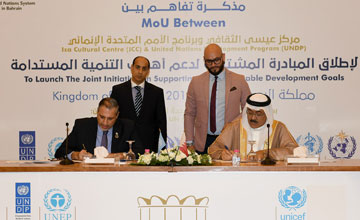On 7 May, the United Nations Development Programme (UNDP) signed a memorandum of understanding with the Bahraini government’s Isa Cultural Center (ICC) regarding promotion of the Sustainable Development Goals (SDGs). Just two months earlier, at the 34th Session Human Rights Council (HRC), Americans for Democracy & Human Rights in Bahrain (ADHRB) had applauded the decision by the UN High Commissioner for Human Rights to suspend technical cooperation with the Bahraini government due to its ongoing human rights violations. Given the 2013 “Human Rights up Front” initiative of the UN Secretary General to coordinate UN entities to prioritize human rights, it was expected that the High Commissioner’s suspension of cooperation would extend across all UN agencies in line with this mainstreaming program. Unfortunately, in signing this MoU with the ICC, UNDP has clearly chosen to prioritize its programming at the expense of Bahrainis’ human rights.
The Human Rights up Front (HRuF) initiative, begun by Secretary-General Ban Ki-Moon, seeks to “strengthen prevention of serious problems that cut across the UN’s three pillars of peace and security, development, and human rights pillars,” with particular attention towards severe human rights issues. The goal is to coordinate staff from country level teams to headquarters regarding actions to prevent and respond to violations of human rights or humanitarian law.
OHCHR has repeatedly called out the Bahraini government as severely restricting human rights and taken steps in line with the HRuF initiative’s goals. During the 34th Session of the Human Rights Council in March this year, Bahrain’s parliament invited High Commissioner Zeid Ra’ad al-Hussein to visit the kingdom, promising no restrictions on his activities. However, the Bahraini government has denied access to OHCHR technical teams—a crucial forerunner to any visits of the High Commissioner. In HC Zeid’s annual remarks at HRC 34, he called on the government of Bahrain to “undertake concrete confidence building measures, including allowing [his] Office and Special Procedures mandate holders to swiftly conduct visits.” Ultimately, OHCHR decided to suspend technical cooperation with the Bahraini government to avoid whitewashing its human rights abuses or act as a mere photo prop, as a strategy to force Bahraini officials to improve human rights in their nation.
With Bahrain’s current human rights situation in a “crisis,” unified UN pressure is vital. HC Zeid has expressed deep concern over Bahraini authorities’ growing repression and restricting of civil society space. UN Special Procedures have called attention to the widespread and systematic discrimination against the Shia majority, including the forced dissolution of Al-Wefaq, Bahrain’s largest opposition group, in July 2016. Unfortunately since HRC 34, Bahraini authorities have made no progress on the human rights front; instead, they carried out a series of reprisals, including implementing travel bans against human rights defenders and civil society activists for their attempted participation in the HRC’s Universal Period Review of Bahrain on 1 May 2017.
Continued cooperation of UNDP as well as other UN country teams with the Bahraini government signals a complete disregard of OHCHR’s efforts to pressure the Bahraini government to reverse course on its systematic repression of human rights. ADHRB is also disappointed in UNDP’s neglect of the Human Rights up Front initiative. UNDP promotion of the SDGs with the ICC only serves to provide the Bahraini government an opportunity to claim substantive efforts towards improving its citizens’ lives without taking any effective actions to uphold or protect human rights. Human rights are a cornerstone of the UN’s work, and it is critical that all organs of the UN are united to stand against violations in Bahrain.





